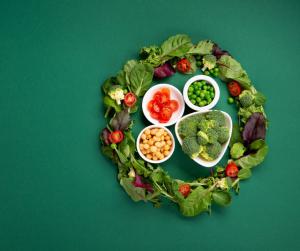By: Judy Davie - The Food Coach
 Protein is an essential macronutrient vital for the body's growth, development, and overall health. It plays several crucial roles in the body: Protein is an essential macronutrient vital for the body's growth, development, and overall health. It plays several crucial roles in the body:
Building and Repairing Tissues: Proteins are the building blocks of muscles, bones, skin, cartilage, and blood. They aid in tissue repair and growth. For example, when you engage in physical activities like exercise, protein helps repair and build muscle tissue.
Enzymes and Hormones: Many enzymes and hormones are made of proteins, which are essential for various chemical reactions within the body. For instance, digestive enzymes help break down food, and hormones regulate bodily functions.
Transportation and Storage: Proteins help transport essential molecules, such as oxygen in the blood (hemoglobin), and store certain nutrients.
Immune Function: Proteins are vital for a robust immune system. Antibodies, which are crucial for fighting infections, are made of proteins.
Energy Source: While carbohydrates and fats are the primary sources of energy, the body can use protein as an energy source if necessary. However, its primary role is not energy provision.
How much protein should you eat?
How much protein you eat depends on a number of factors including age, sex, weight, activity level, and overall health. However, the general guideline for protein intake is between 0.8 grams to 1.2 grams of protein per kilogram of body weight. More active individuals, or those looking to build muscle, or pregnant and breastfeeding women should aim for the higher end of the recommended requirement.
What if I don't like meat?
Although animal foods are hands down the best source of protein available, there are many ethical, environmental, or healthy reasons why some people prefer to get their protein from plant-based foods. For some it's simply a matter of preference.
Thankfully, there are numerous plant-based sources of protein available that can adequately meet an individual's protein needs. These include legumes, nuts, seeds, tofu, tempeh, quinoa that offer a diverse array of nutrients including protein.
Do vegetables contain protein?
Vegetables do contain protein, and while they don't provide as much protein as animal sources, eating a wide variety of vegetables will contribute to your overall protein intake.
For a more significant protein intake from vegetables, it's beneficial to include a variety of in your diet and combine them with other protein-rich plant-based foods such as legumes. nuts, seeds, quinoa, tofu, tempeh, and wholegrains. This can help ensure you're getting a good balance of essential amino acids, which are the building blocks of protein that our bodies need.
How much protein in vegetables (approximate numbers)
Black beans: 15 grams of protein per cooked cup.
Lentils: 18 grams of protein per cooked cup.
Chickpeas 15 grams of protein per cooked cup.
Peas: 8 grams of protein per cooked cup.
Spinach: 5 grams of protein per cooked cup.
Broccoli: 2.5 grams of protein per cooked cup.
Brussels sprouts: 3 grams of protein per cooked cup.
Asparagus: 3 grams of protein per cooked cup.
Artichokes: 4 grams of protein per cooked cup.
While vegetables are a source of protein, it is harder to meet your daily protein needs. If you are struggling to do so, there are several natural plant-based protein supplements available for those looking to increase their protein intake without consuming animal products.
Comments
Be the first to comment!
|